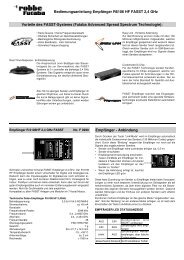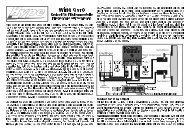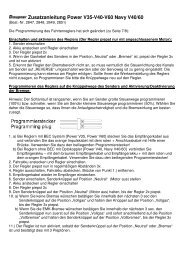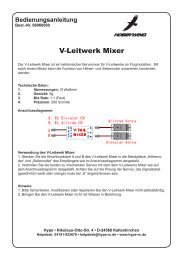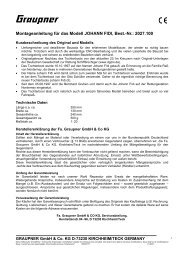4497 -Micro Star 700 - DE - EN - FR - CMC-Versand
4497 -Micro Star 700 - DE - EN - FR - CMC-Versand
4497 -Micro Star 700 - DE - EN - FR - CMC-Versand
Create successful ePaper yourself
Turn your PDF publications into a flip-book with our unique Google optimized e-Paper software.
Additional notes on handling LiPo batteries<br />
6<br />
<strong>Micro</strong> <strong>Star</strong> <strong>700</strong><br />
Avoid short-circuits.<br />
Never short-circuit these batteries. Shorting the terminals allows a very high current to flow, and this heats up the cells.<br />
This in turn may lead to a loss of electrolyte, gassing (venting of gas) or even an explosion. When handling Graupner<br />
LiPo batteries keep them well away from conductive objects and surfaces to avoid the danger of a short-circuit.<br />
Mechanical strength of the case film:<br />
The aluminium laminate film which encloses the cells is easily damaged by sharp objects such as pins, knives, nails,<br />
motor terminals or similar: If the film is damaged, the battery is useless, and for this reason the battery must be<br />
installed in the model in a position where it cannot be distorted or damaged even in a bad landing or crash. If the pack<br />
were to be short-circuited, it could burst into flames.<br />
Temperatures above 70°C may also damage the case and cause leaks; this will result in loss of electrolyte, the battery<br />
gets useless and must be disposed of.<br />
Mechanical shock:<br />
LiPo batteries are not as mechanically robust as metal-cased cells, and for this reason you must avoid subjecting them<br />
to mechanical shocks such as dropping, hitting, bending, cutting, scoring, deforming or drilling into the laminate film.<br />
Never bend or twist a LiPo battery, and do not exert pressure on the battery or its connections.<br />
Handling the battery terminals:<br />
The terminals of LiPo cells are not as robust as those of other batteries; this applies in particular to the aluminium +<br />
terminal.. Please note that the terminals can easily break off. Due to the heat transfer it is not possible to solder to the<br />
aluminium terminals. The terminals should be fitted with a suitable strain relief.<br />
Cell connections:<br />
It is not possible or permissible to solder directly to the battery cells.<br />
Attempts at direct soldering may cause damage to cell components such as the separator or insulator. Battery<br />
connections can only be attached by the industrial process of spot welding. If a cable is missing or gets torn off, a<br />
professional repair by the manufacturer or distributor is required.<br />
Replacing individual battery cells:<br />
Individual battery cells may only be replaced by the manufacturer or distributor. This work must never be carried out by<br />
the user.<br />
Re-using damaged cells:<br />
Damaged cells must never be re-used.<br />
Indications of damage include broken housings, distortion of battery cells, escaping electrolyte or a smell of electrolyte.<br />
If your LiPo battery exhibits any of these problems it must not be used again.<br />
Damaged or exhausted cells constitute toxic waste and must be disposed of in the appropriate manner.<br />
General warning notes<br />
LiPo batteries must not be thrown in a fire or incinerated.<br />
LiPo cells must not be allowed to come into contact with fluids such as water, salt water or drinks, even for a very short<br />
period. Avoid all contact with liquids of any type.<br />
Individual cells and packs made up of cells are not playthings, and must not be allowed into hands of children. Store<br />
batteries and cells well out of the reach of children.<br />
Batteries must be kept out of the reach of babies and small children at all times. If a battery should be swallowed, seek<br />
emergency medical attention immediately.<br />
Batteries must not be placed in a microwave oven or subjected to pressure. This may result in smoke and fire or even<br />
worse.<br />
Never dismantle a LiPo battery. Dismantling a pack may cause internal short-circuits, with the possible results of<br />
gassing, fire, explosion and other problems.<br />
LiPo batteries contain toxic electrolytes and electrolyte vapours which are damaging to health. Take great care to avoid<br />
direct contact with electrolyte. If electrolyte contacts your skin, eyes or any other body part, immediately wash it off<br />
using plenty of clean water, then consult a doctor.<br />
Batteries which are build in a device should always be removed if the device is not to be used immediately. Always<br />
switch equipment off after use n order to avoid the cells becoming deep-discharged. Recharge batteries in good time.<br />
Do not use deep-discharged batteries again.<br />
The company of Graupner GmbH & Co. KG is unable to ensure that you use the correct methods to charge and<br />
discharge these cells, and for this reason we are obliged to refute any claim under guarantee if the cells have been<br />
charged or discharged incorrectly.





